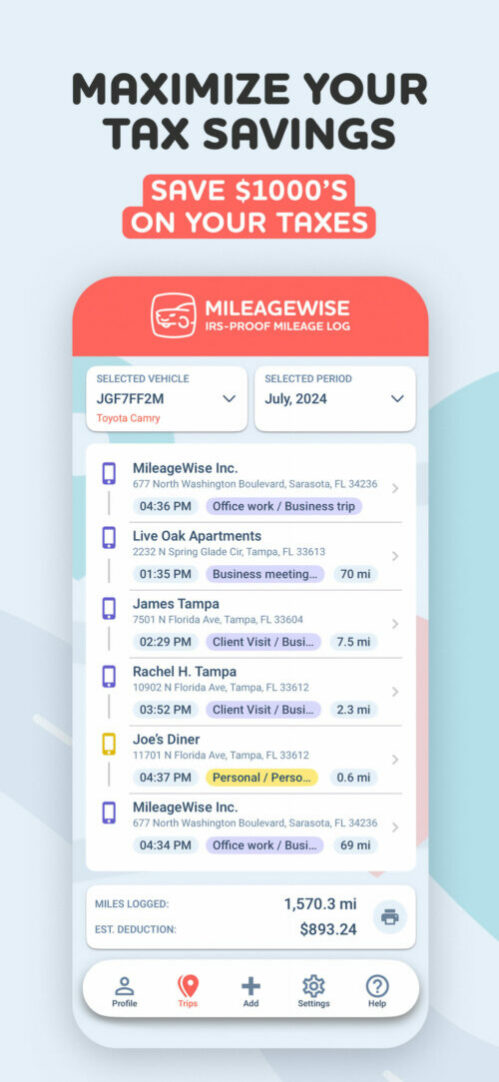Many freelancers, independent contractors, and small business owners receive income reported on a 1099 form. While this offers flexibility and autonomy, it also comes with tax responsibilities that can feel overwhelming. Understanding how to reduce 1099 taxes is crucial for maximizing your income and ensuring compliance. In this article, we will explore effective strategies to minimize your tax liability while still staying within the law.

Level Up Your Mileage Tracking
MileageWise: Tracks trips automatically via vehicle movement, Bluetooth, and Plug’N’Go without draining your battery.
AI-Powered Mileage Recovery: The AI Wizard helps reconstruct past mileage logs, filling gaps in your log to ensure compliance.
Built-in IRS Auditor: Checks and corrects up to 70 logical errors in logs, ensuring they meet IRS standards for tax deductions.
Web Dashboard & Team Collaboration: Manage logs, import trips, and collaborate with teams through the web dashboard, ideal for businesses.
Try it for free for 14 days. No credit card required!

Understanding 1099 Taxes
Many freelancers and small business owners get income on a 1099 form. This gives them freedom but also tax duties that can be tough. Knowing how to cut down on 1099 taxes is key to keeping more of your earnings and following the law.
Top Strategies to Reduce 1099 Taxes
1. Keep Accurate Records
Keeping detailed records of your income and expenses is a great way to lower your taxes. This includes:
- Invoices and receipts
- Bank statements
- Payment confirmations
- Track your mileage with a mileage tracker app
With good records, you can spot expenses to deduct. This can reduce your taxable income and lower your 1099 taxes.
2. Deduct Business Expenses
As a freelancer, you can deduct business expenses. Some common ones are:
- Home office expenses
- Equipment and supplies
- Business travel expenses
- Professional services (e.g., legal and accounting fees)
- Marketing and advertising costs
- Mileage costs
Maximizing your deductions can greatly reduce your taxable income and lower your taxes.
3. Use a Retirement Plan
Contributing to a retirement plan can lower your taxable income. Here are some options:
- Solo 401(k): Great for self-employed, allows contributions as both employee and employer.
- SEP IRA: Offers higher contribution limits.
- Traditional IRA: Allows tax deductions on contributions.
Contributions to these plans can be deducted from your taxable income. This can lower your 1099 taxes.
4. Consider an LLC or S-Corp
Forming an LLC or being taxed as an S-Corp can save you a lot on taxes. Here’s how:
- LLC: Offers liability protection and flexible taxation. You might deduct expenses not available to sole proprietors.
- S-Corp: Allows a salary and distributions, which may not be taxed as self-employment income.
Talking to a tax expert can help choose the best structure for your business.
5. Make Estimated Tax Payments
As a 1099 earner, you must make estimated tax payments. This helps avoid penalties and interest. Accurate estimated payments can manage your cash flow and prevent a big tax bill in April.
6. Utilize Tax Credits
Look for tax credits you might qualify for. Credits directly reduce your tax liability. Some examples include:
- Earned Income Tax Credit (EITC)
- Child Tax Credit
- Education credits for courses related to your business
Research and use all available credits to effectively reduce your 1099 taxes.
When to Seek Professional Help
Many strategies can be done on your own, but it’s smart to get help from a tax pro for tax optimization. This is true if you have complex finances, like many income sources or big business costs. A CPA or tax advisor can give you specific advice, find more deductions, and guide you through tax laws.
Conclusion
Lowering your 1099 taxes is easier than you think. Keep good records, use all deductions, save for retirement, and maybe change your business setup. This can greatly reduce what you owe in taxes. Always keep up with tax laws and think about getting professional advice.
Use these tips to keep more of your money. This way, you’ll have a better tax season.


